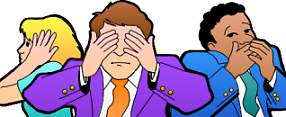Note: This is one chapter from
Clearbird's manual Ethics and Auditing, giving the auditor the basic concept of
how the use of Ethics fits in with auditing. The full 'Ethics Dictionary' is
also included for additional information.
Ethics and Auditing
With auditing we seek to bring about
higher awareness and increased ability in the individual. We seek to make the
person more rational and more self-determined. This is a safe activity as higher
awareness and less reactivity makes the person more responsible and more ethical. We are not releasing the powers of a monster that
would dominate all around him and make them miserable. We believe Man is
basically good and it proves out in auditing. When we audit a person we are removing the
things that possibly made him feel and act like a monster. With auditing we are restoring
responsibility, awareness and ethical conduct. Pc's increased awareness and
responsibility makes him capable of caring for more of his Dynamics and see the
viewpoints and vital interests of others and respect them.
 |
A person with bad impulses
tends
to hold self back and reduce his
own power and influence. |
A person with bad
impulses tends to hold self back and reduce his own power and influence.
Criminals routinely make sure they get stopped. This
speaks to the basic goodness of Man as well. He is trying to reduce
his reach and awareness so the unethical behavior won't bother him. He may
passionately try to explain his behavior away. He may develop all kinds of medical and
psychological symptoms in a reactive attempt to stop himself. He may become deaf
and blind to what he is involved in. "If
I just close my eyes, don't think deep thoughts, take my medication and avoid
exposing myself to
others I'll be fine". You will also see this attitude when a
person is out of his element and involved in a group or company that does
questionable things. The person knows something is wrong but is on the other
hand not willing to give up the security the group offers. Solution: "I'll
just close my eyes, shut my ears and keep quiet"; "I'll wash my hands". Here we have an
Overt of omission which is out-ethics as well. It is much less than the greatest
good for the greatest number of Dynamics.
|

|
|
Closing one's eyes, etc. to what is going on is certainly
in the way of higher awareness. It may be a way to get
by, but with processing we are trying to bring about
more awareness and power and a higher Ethics level. |
We all have a built-in sense of what is ethical and what is not. The relatively unaberrated individual
who is his own good self will seek to do the right thing. That is what we call a
social individual (see Level 4-Pro). Situations in life can
of course be complicated and it may not always be obvious what the right thing
to do is. The social individual, however, is engaged in an honest effort,
limited by his viewpoint and ability, to predict long range consequences and
based on that do what he considers right, just and fair.
A person can however be out of valence and have lost his own good self and become thoroughly
evil and inhuman. That is what we call an anti-social personality, a suppressive person. A suppressive
person is completely stuck in some hidden conflict of the past. He is stuck in a
life-threatening conflict where the choice was, "It is him or me!" He
had to wipe out the other guy to survive. Maybe he got wiped out, but the lesson
he learned, and now is stuck in, was to try to wipe out the other guy first. This is discussed at Level 4 Pro
in some length. A person can be addicted to things, not only
drugs, but to food, sex, work, power, money, etc., etc. Any serious addiction or
obsession will lead the person down the wrong track and cause severe problems
in other areas and for other people and Dynamics.
Auditing as governed by the
Auditors Code is not designed to deal with individuals who are hostile to
the activity. Nor are the Grades and other Major Actions designed to deal with
ongoing out-ethics situations that the person is creating, is part of or
covering up. In the section "Who can the auditor help" we pointed out that auditing is a very permissive activity.
The Grades are designed to
be applied to people who have a self-determined desire and willingness to improve. Out-ethics
goes right up against this. The person is engaged in the opposite activity. This
does not mean that out-ethics people can't be helped. It means that physical and
ongoing situations have to be addressed by physical and direct means, not Grades
auditing.
 |
Shortsighted interests, desires and
addictions will lead a person down the
wrong track to unethical behavior. |
Ethics Action
An Ethics action is a disciplinary action. A police action if you will. It
is an intervention to call a person to order and tell him to change his behavior,
turn his life around in some area, and consider and respect the vital interests of others and sometimes
his own vital interests as well.
When we talk Ethics action versus
auditing we use the auditing technology as much as we can and keep
intervention with Ethics actions to a minimum. It is however a technical fact
that auditing will only be effective if Ethics is in. The auditor has to be ethical and
well intended to apply the technology correctly. The preclear has to have his or
her Ethics in to a point where the pc isn't engaged in activities he feels he
actively has to withhold from the auditor. Nor should pc be engaged in ongoing battles that
make him roller-coaster and loose gains between sessions. For auditing to work
we need a safe environment. We need a pc and an auditor working together on the
same goal. Sorting out practical
and ongoing matters and situations is not what Grades auditing is for. If it
doesn't resolve by flying the rudiments it has to be
done outside session. When practical matters interfere with auditing they have to be
addressed directly and with the right tools such as an Ethics action. Ethics is thus that additional tool needed to make auditing work.
 |
 |
|
Ethics Actions take care of ongoing
life-situations that interfere
with auditing. The problem is an 'out-rudiment' situation the pc
is involved in. It takes a change in behavior by pc to
remedy it. |
So we have Ethics actions as
different from Ethics. An Ethics action is an intervention by a person in
charge. Ethics by itself is a self-determined
activity. Ethics as a self-determined activity can be taken a lot further. Ron Hubbard has developed Ethics technology that can bring about improvements in persons' lives.
These methods work very well when the person's basic Ethics is already in. It tends however to go into
self-help methods and management tools, if only to improve ones own affairs, and
is outside what we try to cover here where the subject is to get the pc in shape
to receive Grades auditing and effectively benefit from it.
By Ethics situations that need
attention we thus mean ongoing situations in pc's life, including PTS
situations; Withholds and messy circumstances that make it a waste of good
auditing time to ignore. We mean pc is engaged in groups and activities
that are contrary or hostile to the activity of auditing. Such situations and behavior tend to be the pc's biggest
problems and upsets in life and will routinely surface each time the auditor flies
the rudiments. This behavior makes the person
hard to audit as it makes him unwilling to be in-session and freely look in his Bank. He routinely
have life throw these out-rudiments situations at him. The
technical side of this is: a person with a Present Time Problem or Withhold won't
benefit from
auditing. A person audited over an ARC Break will get worse. In the case of
missing Withholds the pc may blow up in the auditor's face and refuse further
auditing (see Auditor's Rights). Also, a pc who is not with the activity but
somehow in a games condition with the auditor won't be in-session and won't
benefit.
When to Use Ethics Actions
There are some maxims on when and how to use Ethics actions and discipline as
tools:
Ethics is that additional tool necessary to make it possible to
get technology in. That's the whole purpose of Ethics. When you've got
technology in, that's as far as you carry an Ethics action.
The purpose of Ethics is to remove counter intentions from the environment.
And having accomplished that the purpose becomes to remove other-intentionedness
from the environment. What we have with Ethics is a system of removing the
counter-efforts to the activity.
An ethics situation is an ongoing
situation that exists in real life. It is not just one random incident. It's a
non-optimum situation that the pc is creating or at least is part of in an
active and real way. The pc is in some area of his life going in the direction
of self-destruction or destruction of others. This is in direct opposition of
the course the auditor is seeking to take him. Thus it is a real and present
time problem preventing gains in auditing.
In practice a pc who has an ethics situation
is sent to an Ethics Officer - or Ethics Counselor - to have it discussed and
handled in in a direct way in the real universe.
The Ethics Officer counsels the pc to sort out
his or her life on a practical level. Ethics Officers routinely handle pc's who have a PTS situation of one kind or
another. In the practical definition of Ethics above we had that, "the
purpose of Ethics is to remove counter intentions from the environment".
That is exactly what the Ethics Officer does, when he handles a pc's PTS
situation. The pc is PTS due to these counter-intentions from Antagonistic
Terminals. The Ethics Officer will interview the pc to find out what is going on
paying special attention to what the pc does to invite the situation or make it
worse. This was discussed on Level Four Pro in the chapters about PTS.
The Ethics Officer deals with a number of practical problems and situations. This can
include schedules, troubled relationships, unethical habits or routines, bad situations and
involvements, involvements with groups hostile to auditing, and down the list of human weaknesses, addictions, temptations, misbehavior,
vices and outright laziness and ignoring basic duties. The whole purpose of the Ethics
handling at this stage is to educate the
pc and use enough discipline in order to make the pc straighten up and stop the out-ethics behavior
for the time being. In other words, bring about a change
of behavior in the pc.
After interviewing
the pc the Ethics officer will usually work out
and write up an Ethics program for the pc to do. The Ethics Officer makes sure the
pc carries out the steps. When this is done to a good result the pc can go back
to auditing. The Ethics program has enabled the pc to overcome the out-ethics for now and pc can be
fully in-session. Ethics has to be in for auditing
to work. Ethics' job is to 'hold the fort' until tech can go in and the pc
realize why he was doing what he was doing. Once he realizes his own built-in sense of Ethics
will do the rest of the job. He will realize it was irrational and counter-survival behavior and now simply know better than
falling in the same trap again.
Gradient of Ethics
Ethics actions should always be done on a gradient. It may be enough to tell
somebody what he is doing is wrong. Have him consider the consequences and
apply reason. After all, one of the definitions of Ethics is 'Reason'. A person
in good shape, with no criminal type of out-ethics situation, will most likely realize his
mistake and change his behavior. As discussed
under 'False PTS' there is a whole class of situations the pc is getting himself
into out of mere ignorance and lack of knowledge. This should always be looked
into and be remedied as an important step where it exists.
 |
It may be enough to tell somebody
what he is doing is wrong. Have
him consider the consequences
and use his common sense. |
The permissive in-ARC approach is however not always enough. For
one thing, the out-ethics behavior can be deeply rooted in the person's way of
life, his habits, way of thinking, or to his immediate advantage. The out-ethics
behavior is how he 'solves' problems and is rooted in his reactive Bank. You
can't always convince the pc with arguments to change. A cannibal feels it his
right and a moral action to eat missionaries. A criminal may consider it his job
to be the best criminal he can be. Yet it isn't exactly ethical behavior.
 |
A criminal may consider it to be his
job to be the best criminal he can be.
Yet it isn't exactly ethical behavior. |
The Ethics officer in relation to pc's is not a
moralist. But he is enforcing the natural law of the greatest good for the
greatest number of Dynamics up to a point. He is trying to get a job done so the pc can be audited and
sort the whole thing out in session on a self-determined basis.
The basic maxim the Ethics officer operates on here is:
The Ethics officer has to exert more
authority and pressure on the pc than the pc's Bank or bad habits do.
Even though the tools are different the basic
equation he operates on is very similar to Auditors Trust. Auditors Trust says,
"Auditor plus pc is greater than pc's Bank". The skilled Ethics officer works with and appeals to the basic good self of the person in front of
him. He uses enough authority and pressure aimed at the Bank to get the person
to straighten out and turn things around. So we have:
The pc's built-in sense of Ethics plus the Ethics
officer's authority is greater than the pc's Bank and bad habits.
 |
 |
|
The pc's built-in sense of Ethics plus
the Ethics
officer's authority is greater than the pc's Bank. |
In other words, the pc's Bank, convenience, or
grown in habits may tell the pc that such and such an action is desirable or OK. The
Ethics officer has to make the pc understand in no uncertain terms that this interferes
with his auditing and he has to change his behavior, life style, way of handling
things, or whatever, in order to benefit from and be acceptable for auditing. The pc
may have to do educational steps, including coaching on how to go about handling
a situation. He may have to reconsider with whom and how he does his business of
life.
 |
There is an element of old-fashioned
discipline
in any Ethics action. But coaching, hatting,
use of various Ethics tools can also make it a
positive experience similar to auditing. |
A good Ethics officer understands exactly how much pressure and
authority he has to apply in order to overcome the out-ethics situation. He
understands that reason in form of educational materials and hatting goes a long
way, but also that it does not go all the way. Discipline and toughness and
being unreasonable about pc explaining it away are routinely required. A tough
no-nonsense attitude and ability to cut to the bone of matters in a
disrespectful and factual way is what a good Ethics officer does. He looks at the facts
rather than listens to the longwinded explanations. He may very well have to
invalidate the practices the pc is involved in. He is not bound by the Auditors
Code. But he acts in a professional and factual manner. He looks at the evidence and investigates when needed. If
you want to compare it with technology it is more related to coaching and
instructing than auditing. A good coach will always hold his twin to an
acceptable standard before giving a pass.
 |
The Ethics officer looks
at the evidence and
investigates when needed. |
He may have to go as far as denying the pc
auditing until such time the pc can demonstrate that he has turned his life
around. In the case of hard core suppressive persons this may not be this
lifetime. It may take major events of death and rebirth, complete change of the
political situation or system the suppressive person depends on, etc. for a radical change to
happen. Although this is extremely rare the Ethics officer should realize that
if any and all well-intended attempts to set the person straight fails he may be dealing
with an individual that just doesn't want to change. Had he been caught as
a young bully there would still have been time. Now the bully's whole existence depends
on preying on others or holding them down. In such a case
the person will be denied auditing until he has demonstrated a radical change of
lifestyle.
We don't owe to audit everyone just because they want auditing and pay for it. We
can only help people who honestly want to improve. Getting more aware and
improve as a thetan go hand in hand with a higher Ethics level. A person who is
unwilling to see that and want auditing for the power and glory and the control
over his fellow Man he sees himself achieving is going in a
completely different direction. Such a person should be given a refund and be
told why. He should be told that he is not acceptable for auditing at this time.
Auditing works very well when Ethics is in. Ethics has to be in in the auditor
as well as the pc. They have to work towards the same goal. Auditing does not work
when Ethics is out. This is
an almost divine safety mechanism in the subject itself. It makes it very hard
to misuse the subject for unethical reasons or purposes.








